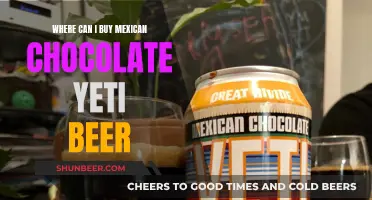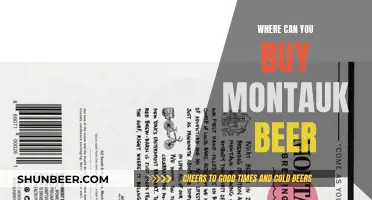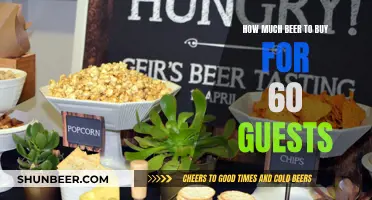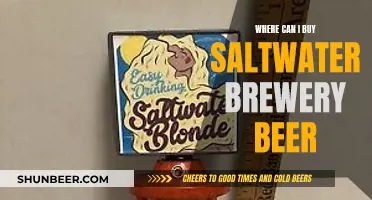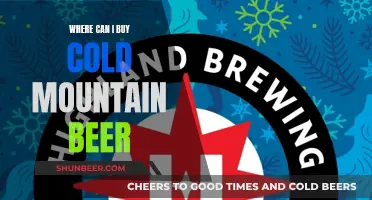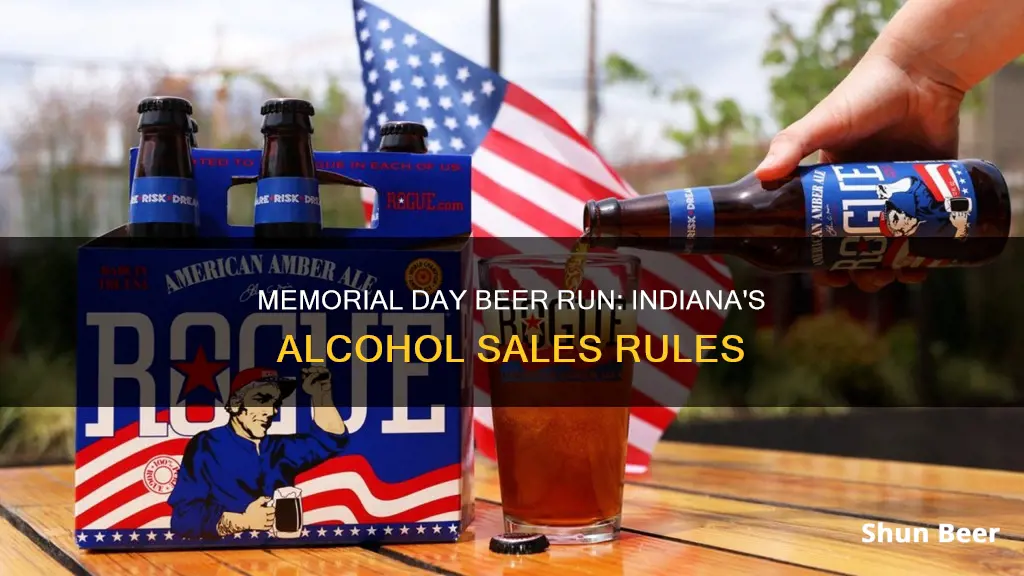
Indiana's alcohol laws have been described as archaic and obsolete, at times contradictory, and often confusing. They are a legacy of Prohibition, and of Prohibition's end, which allowed states to set their own rules. Indiana's alcohol laws have evolved over the last century, with the state allowing alcohol sales on Sundays as of March 4, 2018, and on Election Day since 2010. Indiana also allows people to drink alcohol in public places. So, can you buy beer in Indiana on Memorial Day?
What You'll Learn

Indiana's alcohol laws are a legacy of Prohibition
Indiana's alcohol laws have been described as "archaic and obsolete, at times contradictory, and often confusing". They are a direct legacy of Prohibition, and of its end in 1933, which allowed states to set their own rules. Over time, Indiana legislators have made changes to the laws to satisfy different groups.
The state's history with alcohol has been a curious one, dating back to its territorial days when it was governed from Vincennes. Indiana's journey with alcohol took a significant turn in 2018 when Sunday carryout alcohol sales became legal. This change was long-awaited, as Indiana was one of nearly a dozen states to enforce a complete ban on Sunday alcohol sales outside of bars and restaurants.
The roots of the Sunday ban can be traced back to the state's early days. When Indiana became a state in 1816, religious objections, particularly from Protestant groups like Methodists and Baptists, influenced the decision to prohibit Sunday alcohol sales. This ban remained in place for most of the next two centuries due to continued pressure from religious leaders.
By 1918, the temperance movement had gained significant traction, leading Indiana to go "dry" as a state, two years before the national prohibition of alcohol was enacted in 1920. On January 14, 1919, Indiana played a pivotal role in the ratification of the 18th Amendment, becoming one of the necessary three-fourths majority of states needed to prohibit alcohol sales nationwide.
However, by 1933, Prohibition was widely ignored, and Indiana took steps to repeal the strict alcohol ban. The state passed a liquor control act that allowed retail whiskey sales only in drugstores, with beer and wine permitted in drugstores and restaurants. Even after Prohibition ended, Indiana continued to enforce restrictions on alcohol sales, including a ban on Sunday sales, which remained in place until 2018.
Indiana's alcohol laws have continued to evolve, with changes such as allowing alcohol sales on Election Day and Christmas Day, and permitting the sale of cold beer in liquor stores. Despite these changes, Indiana's alcohol regulations still reflect the influence of the state's religious history and the legacy of Prohibition, resulting in a unique and sometimes confusing set of laws.
Best Places to Buy Beer Near DC's National Mall
You may want to see also

Alcohol can be sold in Indiana from 7 a.m. to 3 a.m. daily
Indiana's alcohol laws have been described as \"archaic and obsolete, at times contradictory, and often confusing". They are a legacy of Prohibition, and of the end of Prohibition, which allowed states to set their own rules.
Indiana's alcohol laws have evolved over the last century. In 1918, Indiana went dry as a state. In 1920, the 18th Amendment (national prohibition of alcohol) took effect. In 1933, Prohibition was officially repealed with the passage of the 21st Amendment. In 1935, Indiana passed a liquor control act that said retail whiskey could be sold only in drugstores but not for drinking on the premises. Beer and wine could be sold in drugstores and restaurants, but sales on Sundays, holidays, and Election Day were prohibited.
In 2010, the prohibition of Election Day alcohol sales was repealed. Sunday carryout sales were also allowed at microbreweries. In 2013, the General Assembly passed a law to allow craft artisan distilleries to sell locally made hard alcohol, such as bourbon or vodka, on-site. Previously, only the wholesale of hard alcohol had been permitted. In 2014, wine and beer sales were allowed during the Indiana State Fair, and breweries were permitted to sell growlers at farmers' markets.
In March 2018, Indiana residents were allowed to purchase alcohol on Sundays from liquor stores, groceries, pharmacies, and convenience stores from noon to 8 p.m.
Beer and Wine Licenses: Michigan's Easy Access
You may want to see also

Alcohol sales are restricted on Sundays
Indiana's alcohol laws have been described as "archaic and obsolete, at times contradictory, and often confusing". They are a legacy of Prohibition, and of the end of Prohibition, which allowed states to set their own rules. Over time, Indiana legislators have made changes to the laws to satisfy different groups.
The restrictions on Sunday alcohol sales are a remnant of Prohibition-era "blue laws", which were largely supported by religious groups who wanted to preserve Sunday as a day of worship. Other anti-alcohol groups also wanted to avoid giving consumers another opportunity to purchase alcohol. Interestingly, liquor stores also supported the ban, as Sunday is the second busiest grocery shopping day of the week. If alcohol was available in grocery stores on Sundays, consumers might stock up on beer, wine, and spirits while doing their food shopping, rather than making a separate trip to a liquor store.
Despite these objections to selling alcohol on Sundays, as of March 4, 2018, Indiana residents were allowed to purchase alcohol on Sundays. Indiana is one of 26 states that allow alcohol to be sold in grocery stores.
Buying Beer and Wine at CVS in Florida
You may want to see also

Indiana allows drinking in public places
Indiana's alcohol laws have been described as "archaic and obsolete, at times contradictory, and often confusing". They are a legacy of Prohibition, and of the end of Prohibition, which allowed states to set their own rules.
Indiana allows people to drink alcohol in public places. Bar and restaurant patrons can legally take their drinks with them when they leave the premises, although individual establishments may restrict this practice. Indiana has no open container laws, meaning that people are allowed to carry an alcoholic beverage in its original container out of a bar or restaurant and consume it on the sidewalks.
People in motor vehicles are not permitted to have an open container unless they are paying for a ride in a taxi or rideshare, or in the living quarters of a recreational vehicle.
Indiana's alcohol laws have evolved over the last century. In 1935, Indiana passed a liquor control act that said retail whiskey could only be sold in drugstores but not for drinking on the premises. Beer and wine could be sold in drugstores and restaurants, but sales on Sundays, holidays, and Election Day were prohibited.
In 2010, the prohibition of Election Day alcohol sales was repealed, and Sunday carryout sales were allowed at microbreweries. In 2013, the General Assembly passed a law to allow craft artisan distilleries to sell locally-made hard alcohol on-site. In 2014, wine and beer sales were allowed during the Indiana State Fair, and breweries were permitted to sell growlers at farmers' markets.
In 2018, Indiana residents were allowed to purchase alcohol on Sundays from liquor stores, groceries, pharmacies, and convenience stores from noon to 8 pm.
In 2021, in response to the COVID-19 pandemic, Governor Eric Holcomb relaxed policies around ordering alcoholic drinks with takeout orders. Restaurants that were only allowed to sell alcohol for on-site consumption were permitted to sell carryout drinks. These regulations were made permanent in 2021, allowing businesses to sell carryout alcoholic beverages for the foreseeable future.
Beer at Stewart International Airport: Buy or Bye?
You may want to see also

Indiana has a ban on happy hour
Indiana has had a ban on happy hour since 1985, but this changed in 2024 when the state governor, Eric Holcomb, signed a bill lifting the ban. The law came into effect on July 1, 2024, and allows restaurants to sell alcoholic beverages at a reduced price for designated parts of the day. The bill, known as House Bill 1086, was authored by Rep. Jake Teshka (R-District 7) and passed with bipartisan support in a 38-10 vote.
The happy hour ban was originally introduced as part of an effort to reduce drunk driving. While the new law allows for discounted drinks, there are still some restrictions in place. Bars and restaurants can offer reduced prices for drinks for no more than four hours a day and 15 hours in a week. Happy hours also cannot be held between 9 pm and 3 am.
The change in the law was supported by the tourism and restaurant industries, who believed it would attract more patrons and increase food sales. It was argued that the ability to offer happy hour would "generally assist an industry that is still fighting its way back after severe losses due to the pandemic."
In addition to the happy hour law, Indiana has several other alcohol-related laws in place. For example, Indiana law requires permittees and their employees to check the identification of any person under the age of 40 when selling alcohol for carryout. The legal hours for the dispensing of alcoholic beverages are 7:00 am to 3:00 am, and retailers may allow the consumption of alcoholic beverages for 30 minutes after these hours, provided the drinks were purchased beforehand. It is also unlawful for a permittee to discriminate between purchasers by granting a price discount that is not available to all.
Best Places to Buy 1919 Root Beer
You may want to see also
Frequently asked questions
Yes, you can buy beer in Indiana on Memorial Day. However, you may need to stock up on alcohol early or plan your pickups based on which stores will be open or closed.
The legal hours for the dispensing of alcoholic beverages in Indiana are 7:00 AM to 3:00 AM, Sunday through Saturday.
No, Indiana actually has no restrictions on the open carrying of alcohol in public spaces. Patrons can carry an alcoholic beverage in its original container out of a premise and consume it on the sidewalks.
No, it is illegal for minors (those under 21 years of age) to buy, consume, or transport alcohol in Indiana.
Yes, Indiana is one of 26 states that allow alcohol to be sold at grocery stores.


